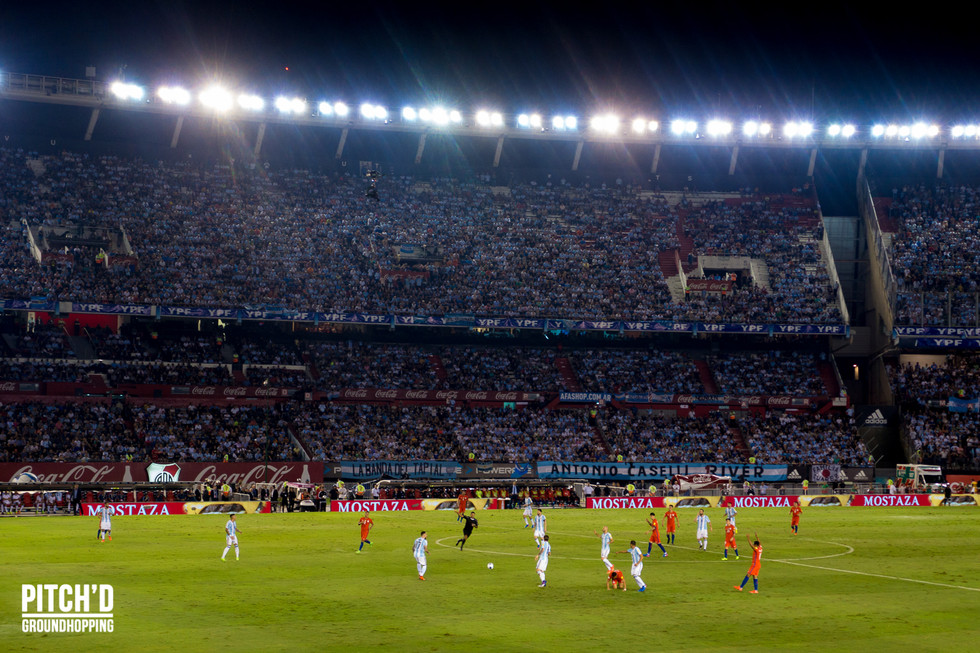GROUND // Estadio Monumental Antonio Vespucio Liberti - CA River Plate (Argentina)
- pitchdgroundhoppin
- Apr 7, 2018
- 3 min read
Updated: Jun 4, 2018
Still in Argentina we also visited the Estadio Monumental Antonio Vespucio Liberti, more commonly called El Monumental. It's the stadium of Club Atletico River Plate and it's also used for the home games of the Argentina football team. We were there during a game of the latter.

CA River Plate was founded in 1901 already and it's considered to be one of the big five in Argentina, next to Boca Juniors, Independiente, Racing Club and San Lorenzo de Almagro. River Plate is named after the English translation of the river Rio de la Plata. Their biggest rivals are Boca Juniors and the derby against Boca Juniors is often referred to as the Superclasico, one of the oldest and most intense derby's in the football world. Strangely the team was founded in the suburb La Boca, where Boca Juniors currently reside.
CA River Plate is in fact a merger between Santa Rosa and La Rosales. In 1905 River Plate joined the Argentinian FA and started in third division. Immediately they promoted to second division, where they would play for the next three seasons. In 1908 they won from Racing Club, earning promotion, but due to the fact the fans stormed onto the pitch the FA decided the game had to be replayed. Not long after River Plate won with even bigger numbers and gave their promotion more shine. In their first season in first division they immediately ended as runner's up. Between 1915 and 1920 they always ended second or third in the league and in 1920 they finally won their first league. Throughout the 20s they would always end in the top of the league.


In 1931 Argentina changed to a professional structure and River Plate was one of the 18 teams that started playing in the professional leagues. That same year they started spending a lot of money for some football players and that resulted in a first championship in 1932. Up until the end of the 50s River Plate would win several titles. The only teams that could win the rest of the titles are the remaining teams of the big five. Although the team was very talented in the 60s it didn't win anything for a whole decade. It wasn't until 1975 River Plate would win another title.
After the first world titel for Argentina at home in 1978 River Plate would see a coming and going of world class football players like Daniel Passarella and Mario Kempes and new coach Alfredo di Stefano. It was also the decade in which River Plate would gain international successes by finally winning the Copa Libertadores and winning from Steaua Bucharest in the intercontinental cup.

The 90s would be a continuation of the big names passing by River Plate. A couple of examples are Hernan Crespo, Marcelo Salas, Marcelo Gallardo, Ariel Ortega and Juan Pablo Sorin. Javier Saviola made his debut in 1998 on a very young age. Especially the end of the 90s was a great period, followed by the same results in the beginning of this new millennium. In 2008 Diego Simeone briefly passed by as coach at River Plate, but the team underwent a lot of ups and downs. In 2011 they relegated for the very first time in professional history and passionate fans made sure all anger was released. One year later they returned and in 2014 and 2015 they managed to win other international cups again.
Other famous players at River Plate are Celso and Roberto Ayala, Batistuta, Caniggia, Cavenaghi, Radamel Falcao, Higuain, Mascherano and David Trezeguet. The stadium was built in 1938 after having moved from place to place in the first 37 years. By building this on the former coast line of Rio de la Plata they took their team to the roots of the naming and it's the biggest stadium in Argentina, often hosting special events.






















Comments